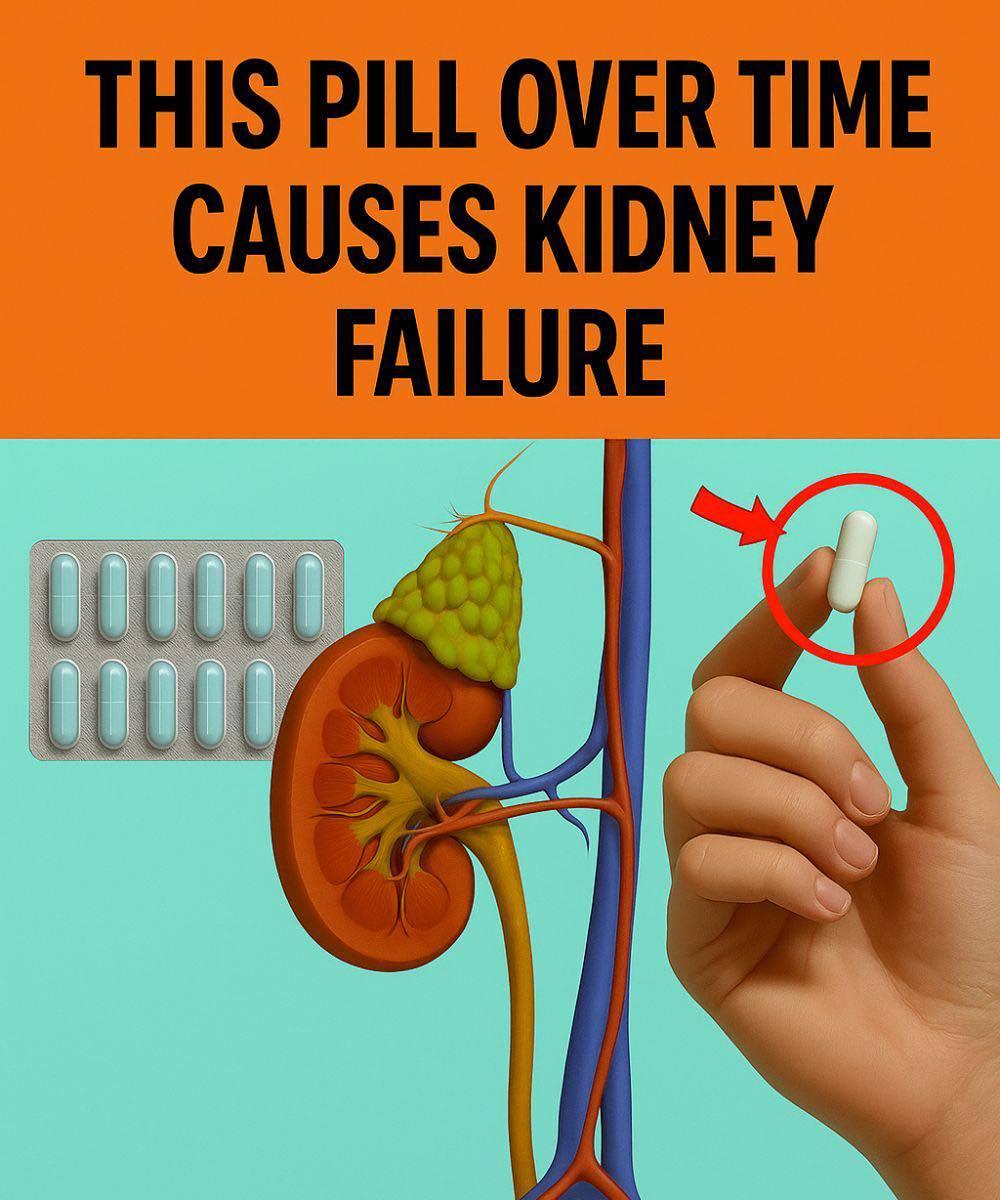These are among the most commonly used over‐the‐counter medications for pain and inflammation (e.g., ibuprofen, naproxen, higher‑dose aspirin). When used occasionally and correctly, they’re relatively safe for many people. However, long‐term daily use—especially at higher doses, or in people with dehydration, low blood volume, heart failure or pre‐existing kidney issues—can reduce blood flow to the kidneys and increase risk of damage. AARP+1
Chronic use of NSAIDs has been associated with a condition called analgesic nephropathy, characterized by papillary necrosis and interstitial nephritis, which can lead to CKD or kidney failure over years. Wikipédia
If a person regularly uses NSAIDs, especially for weeks, months or years, and especially without medical supervision or hydration, kidney risk increases significantly.
2. Certain Blood Pressure & Heart Medications (RAS inhibitors)
Medications that target the renin‐angiotensin system (RAS) — such as ACE inhibitors or angiotensin receptor blockers (ARBs) — are widely prescribed for hypertension, heart failure and kidney protection in certain cases. Paradoxically, emerging research shows that long‑term use of these medications in some patients may be associated with deterioration of kidney filtering capacity due to maladaptive changes in the kidney’s blood vessels and renin‐producing cells. news.virginia.edu
This is not a reason to stop these medications — their beneficial role in many conditions is well‑established. But it highlights the need for regular monitoring of kidney function over time.
3. Certain Antibiotics, Antivirals and Other “Nephrotoxic” Drugs
Some antibiotics (aminoglycosides, amphotericin B), antivirals, chemotherapeutic agents and contrast dye can cause direct kidney injury (nephrotoxicity). These agents may damage the tubules, cause inflammation (interstitial nephritis) or generate toxic crystals in the kidneys. AAFP+1
While these are less likely to be “daily pills” for many people, if used repeatedly, in high doses, without appropriate hydration or monitoring, they can lead to cumulative kidney damage.
4. Lithium
Lithium, which is used to treat bipolar disorders, is well known to require monitoring of kidney function because long‐term use can impair the kidney’s ability to concentrate urine and may lead to chronic kidney injury. Wikipédia
Again, this is not a reason to discontinue under supervision — but to emphasise the “over time” aspect of the risk.
How does pill‑induced kidney damage occur over time?
Understanding the mechanisms helps explain why damage can sneak up on us. Here are key pathways:
-
Reduced renal perfusion (blood flow): Medications like NSAIDs constrict blood vessels in the kidney or interfere with prostaglandins that dilate them, reducing flow, causing ischemia and scarring. AARP
-
Interstitial inflammation and fibrosis: Some drugs trigger allergic or immune‐mediated injury in the kidney tubules and interstitial tissue, leading to long‐term scarring (chronic interstitial nephritis). Wikipédia
-
Crystal or precipitate formation: Certain medications or their metabolites may precipitate in renal tubules, blocking flow and causing damage. AARP
-
Hemodynamic changes and glomerular damage: Some heart and blood pressure drugs may modify the pressure and function within the glomeruli over time, leading to decline. news.virginia.edu
-
Accumulation due to reduced excretion: As kidney function declines, medications that rely on renal excretion build up, worsening toxicity in a vicious cycle. National Kidney Foundation
Because these processes evolve gradually, often without overt symptoms early on, people may be unaware they are accumulating kidney damage until significant loss has occurred.
Warning signs your kidneys may be under strain
While kidney damage can be silent, there are red flags to watch for if you’re on long‐term medication regimens:
-
Change in urination patterns: Reduced urine output, dark concentrated urine, foamy urine (proteinuria).
-
Persistent fatigue, swelling of ankles/feet (edema), unexplained high blood pressure.
-
Loss of appetite, nausea, vomiting, confusion or sleep problems.
-
Anemia or unusual bleeding (kidneys make EPO hormone).
-
Electrolyte imbalances: High potassium, low bicarbonate, changes in calcium/phosphate.
-
Increased creatinine or decreased estimated GFR (eGFR) on blood tests.
If you’re taking a medication that can affect kidneys on a long‑term basis, ask your healthcare provider about regular monitoring — for example, checking serum creatinine, eGFR, protein in urine, blood pressure control, hydration status.
What this means for you — practical steps to protect your kidneys
-
Review your medication list with your doctor or pharmacist. Make sure you understand which pills have kidney risk, and whether you truly need long‐term use.
-
Use NSAIDs sparingly, ideally no more than the lowest effective dose for the shortest duration. Avoid daily high‐dose use without supervision.
-
Ensure adequate hydration, unless restricted by a medical condition. Dehydration magnifies kidney risk.
-
Regularly monitor kidney function, especially if you’re on long‐term RAS inhibitors, lithium, or other potentially nephrotoxic drugs.
-
Manage underlying conditions: High blood pressure, diabetes, heart disease all amplify kidney risk — controlling them helps protect your kidneys.
-
Avoid combining multiple nephrotoxic drugs, if possible. Each added risk magnifies the effect over time. AAFP
-
Report changes promptly: If you notice swelling, changes in urination, rising blood pressure, talk to your healthcare provider.
-
Lifestyle matters: Maintaining a healthy weight, avoiding excessive salt, limiting alcohol, and not smoking all contribute to kidney resilience.
Myth‑busting: What this article is not saying
-
It’s not saying you should stop your medications without consulting your doctor. Many of these drugs save lives and are essential for health.
-
It’s not claiming that every person who takes NSAIDs or blood pressure pills will end up with kidney failure. Risk is highly individual based on dose, duration, other conditions, hydration, monitoring, and age.
-
It’s not suggesting that kidney damage happens quickly in all cases—often it is gradual and silent, which is what makes awareness important.
When to call your doctor immediately
Seek urgent medical attention if you experience:
-
Drastic reduction in urine output or no urine for > 12 hours.
-
Sudden swelling of face, hands or ankles with shortness of breath (possible acute kidney failure).
-
Severe flank pain with blood in urine (possible kidney injury).
-
Very high potassium on blood test (risk of cardiac issues).
-
New drug started recently and you develop rash, fever, abnormal labs or kidney function decline.
Final Thoughts
Pills, when used wisely and monitored properly, bring enormous benefits. However, the phrase “this pill over time causes kidney failure” is a serious caution that invites reflection rather than a blanket alarm. If you’re on a long‐term regimen — especially of NSAIDs, RAS inhibitors, lithium or other potentially nephrotoxic drugs — taking steps to protect your kidneys can make a big difference.
Stay hydrated, keep your healthcare team in the loop, monitor your labs, and ask questions: Is this pill still necessary? Are there safer alternatives? Am I being monitored appropriately?
Your kidneys are vital, irreplaceable organs — they deserve the same attention and care you give your heart, blood pressure and other aspects of your health.

